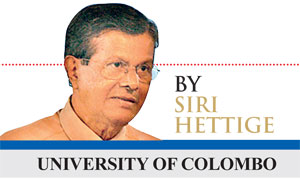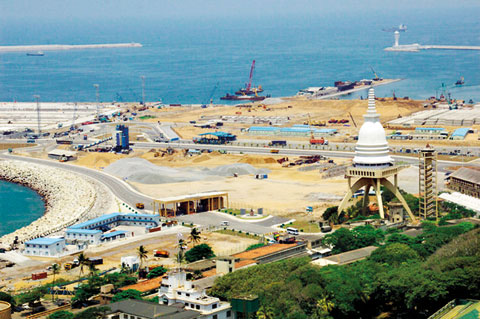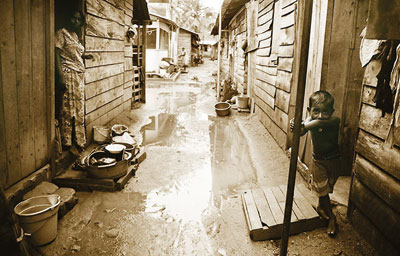Reply To:
Name - Reply Comment

 his is not just another commentary on the Uva PC elections. Already many commentaries, including the present one, have appeared both in the electronic media as well as in the newspapers. A close examination of the results could yield many insights but this article is not an attempt to do so. Yet, it is necessary is make one important comment as a point of departure for this article, namely, the apparent electoral trend shows that good governance in a broad sense still matters in this country.
his is not just another commentary on the Uva PC elections. Already many commentaries, including the present one, have appeared both in the electronic media as well as in the newspapers. A close examination of the results could yield many insights but this article is not an attempt to do so. Yet, it is necessary is make one important comment as a point of departure for this article, namely, the apparent electoral trend shows that good governance in a broad sense still matters in this country.
There is no doubt that the public disillusionment with the current state of affairs in the country is increasing. There are many reasons for this, but three of these need closer and urgent attention.
They are: The Over-emphasis on physical infrastructure development almost at the expense of productive investments in both agriculture and industry and social infrastructure; politicization of almost all public institutions to a point where not only have these institution by and large become dysfunctional but also the morale of the average employee has been reduced to the lowest possible level imaginable and the public perception that all forms of corruption are rampant in almost all areas of public life. 
Physical infrastructure is important for any country but the mix of such infrastructure is as important. For instance, in the power sector, the development of large-scale power plants needs to be pursued in conjunction with more sustainable and renewable sources of energy such as solar, biogas, wind, etc. But this is not necessarily what is happening today.
Similarly, road development needs to be matched by an equal or with more emphasis on railways including light rail systems that can effectively take vehicles off the congested roads. Large-scale private housing development should be matched by low income social housing, particularly in urban areas.
It is true that physical infrastructure development creates temporary employment on construction sites etc., while giving construction firms opportunities to earn big money but it does not necessarily lead to employment creation in the long run. It is productive investments in agriculture and industry that create sustainable employment. When we look at long lists of projects financed by donors today, it appears that most of them are physical infrastructure projects and there are hardly any investments intended to create sustainable productive employment.
It is obvious that we do precious little to tap the enormous potential for employment and income generation in the agricultural sector.
This may be through agricultural diversification, agro-based industries and production of value added goods from agricultural crops. Agricultural inputs are mostly imported today but much of these can be produced here if correct international partnerships are established. Seeds, organic fertilizers, natural pesticides and weed control techniques, agricultural equipment, etc. naturally come to mind. We produce little agricultural raw material for industries like sugar, textiles and paper. There are hardly any value-added products based on the fish harvest in the country.
As is well known, the industrial sector is not expanding and most of the manufactured goods needed in the country are imported from all parts of the world. This is true for almost all areas of industrial production such as pharmaceuticals, chemicals, transport equipment, computers and communications, machinery for industries, household equipment, etc.
Underdevelopment of productive sectors of the economy fuels inflation when the money supply increases without a corresponding supply of locally produced goods. Increasing prices encourage workers to look for overseas employment and the remittances they send to the country also contribute to inflation. Unless a concerted effort is made to create employment in the country and increase production leading to increased exports and reduced imports, the country cannot get out the present vicious cycle.
Health and education today cost a great deal even for poor families. Unless we improve the quality of education at all levels and improve the health services, the enormous pressure that these two sectors exert on the wider population cannot be reduced. Moreover, the life chances of a majority of younger people in the country cannot be improved unless the quality of their education is upgraded.
School buildings and equipment alone cannot bring about the changes needed in the education sector. Issues need to be identified through a consultative process and a process of reform needs to be initiated without further delay.
Politicization of public institutions is not entirely a new phenomenon. It goes back at least several decades. But, the scale then was negligible in comparison to the  situation today. When public institutions are in the hands of often mediocre political appointees, they are not necessarily managed in keeping with long established rules, standards and norms. This naturally demoralizes employees and, as a result, organizational effectiveness is lost. While many people look for opportunities to leave, those who are left behind do not give their best to the institution. Ineffective and dysfunctional institutions obviously hamper development and public welfare. It is natural for those who are adversely affected to become disillusioned and frustrated.
situation today. When public institutions are in the hands of often mediocre political appointees, they are not necessarily managed in keeping with long established rules, standards and norms. This naturally demoralizes employees and, as a result, organizational effectiveness is lost. While many people look for opportunities to leave, those who are left behind do not give their best to the institution. Ineffective and dysfunctional institutions obviously hamper development and public welfare. It is natural for those who are adversely affected to become disillusioned and frustrated.
As mentioned before, corruption has become endemic and pervasive and nothing much is done to arrest the trend. Corruption has many implications, both economic and social. People do not get their money’s worth when public investments are not carefully monitored, evaluated and accounted for.
In spite of widespread criticism, the central government has continued to expand over time and is incredibly top heavy today. Public funds are used to support a massive, privileged political class and the people do not see many of the members of these classes making much of a contribution to solving myriad of problems that the ordinary people are faced with.
What has been outlined above points to the present state of governance in the country. Even though publicly funded media institutions are used to paint a different picture, public discussion and the exchange of ideas continue to take place at an inter-personal level, at work places, informal gatherings, bus halts, etc. independent of the much publicized official version. Several critical private media outlets such as independent newspapers and TV channels have contributed to informal public discussion. It is natural for people who do not directly benefit from infrastructure projects and political patronage to explore possibilities for changing the way the country is governed. In this context, the government as well as the opposition are equally placed to respond to the above issues of great public concern.